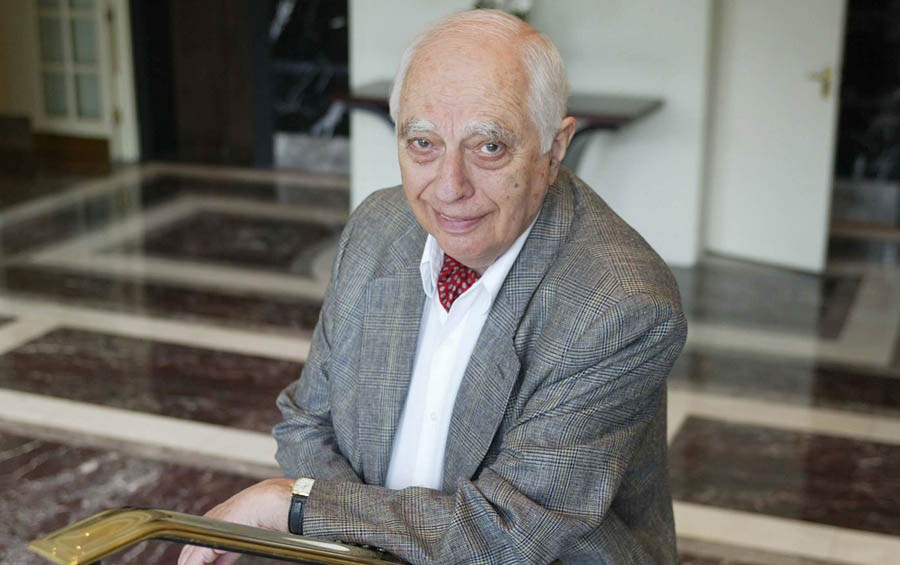

With the demise of Bernard Lewis, neoconservatives in the US must be feeling orphaned. He spent a major part of his life advancing the neo-imperialist and neo-liberal cause. His prominence as an Orientalist and influence in the literate circles and at the state department was beyond measure. His reading of the Muslims, especially of the Middle East, guided George W. Bush, Dick Cheney and Donald Rumsfeld.
Bernard Lewis was an authority on the Middle Eastern affairs in the Bush administration. Bush carried a marked-up copy of one of his articles in his briefing papers. President Bush met with him before and after the invasion of Iraq in March 2003. His bestseller book, What Went Wrong, published just after 9/11, brought him many accolades from the conservative sections of American society. Eminent Yale scholar Paul Kennedy praised the book no end.
Considered as a gospel truth by many, What Went Wrong was marred with sweeping generalisations, dearth of intellectual focus and theoretical conceptualisation. The book was devoid of novel insights and failed to leave behind an enduring academic legacy.
Before we ascertain the role of Bernard Lewis as the most influential historian and commentator of Muslims and Islam, it will be worthwhile to cast a cursory look at his biographical account for a better understanding of his scholarly insights:
Bernard Lewis was born to relatively comfortable Jewish parents, Harry Lewis, a real estate broker, and mother Jane Levy, a homemaker in Stoke Newington, London. He was 12 when he became interested in languages and history while preparing for his bar mitzvah, the initiation ceremony of a Jewish boy at age of 13, after which he observes religious precepts and takes part in public worship. He read Hebrew and begun a lifelong study of languages, including Aramaic, classical and modern Arabic, Latin, Greek, Persian and Turkish. History was his passion. He read Jewish history, the history of Cordoba, Spain under Muslims, Baghdad under the Abbasside Caliphs, and the Ottoman rule. At the university, he became a favourite student of Hamilton Gibb, a well-known scholar of Islam. After attending the Universities of London and Paris, he went on to become an assistant lecturer in Islamic Studies at the School of Oriental Studies in 1938 (later School of Oriental and African Studies). During the war, he served in British Intelligence in the Middle East, where he learned that appeasement of tyranny was disastrous. From 1949 till 1974, Lewis was professor of Near and Middle Eastern History at the SOAS.
He made his way to Istanbul in 1950 when the Turkish government opened the Imperial Ottoman Archives. He was the first western scholar to be granted access to the Archives. He also witnessed Turkey’s first free election, leading to his acclaimed 1961 book, The Emergence of Modern Turkey. That was arguably the best scholarly work that Lewis produced. Any one intending to explore the Turkish history must read this piece of scholarship.
In the mid-1960s, Lewis emerged as a commentator on modern Middle East, and his analysis of the Israeli-Palestinian conflict and the rise of the militant Islam brought him publicity as well as aroused controversy.
American historian Joel Beinin called him "perhaps the most articulate and learned Zionist advocate in the North American Middle East academic community". But Lewis gained prominence only after he migrated to America in 1974. He took up joint appointments at the Institute for Advanced Study in Princeton, New Jersey, and Princeton University, partly to gain more time for research. He also taught at Cornell from 1984 to 1990, among other teaching jobs.
He became an American citizen in 1982. He began to make contact with the neoconservative paladins who quarter of a century later began to influence the American foreign policy decision-making. In the mid-1970s, Prime Minister Golda Meir (1898-1978) of Israel urged her cabinet members to read Lewis’ article that argued Palestinians had no claim to a state.
Lewis thought Christiandom and Islam as civilisations have been in collision since the advent of Islam in the 7th century. In his essay, The Roots of Muslim Rage, which appeared in The Atlantic in 1990, he used the phrase ‘clash of civilisation’ to describe what he saw as inevitable friction between the Islamic world and the West. Political scientist Samuel Huntington used the same phrase for his 1993 article.
I strongly urge young students to critically read this article; where he wrote: "Islam has brought comfort and peace of mind to countless millions of men and women. It has given dignity and meaning to drab and impoverished lives. It has taught people of different races to live in brotherhood and people of different creeds to live side by side in reasonable tolerance. It inspired a great civilization in which others besides Muslims lived creative and useful lives and which, by its achievement, enriched the whole world."
Then he says what he meant to say, "But Islam like other religions has also known periods when it inspired in some of its followers a mood of hatred and violence. It is our misfortune that part, though by no means all or even most, of the Muslim world is now going through such a period, and that much, though again not all, of that hatred is directed against us".
Read also: Crossing of the pens – II
He earnestly believed that Islamic fundamentalism (a phrase coined by him) was antithetical to both secularism and modernism, as embodied by the West. Fundamentalists provided an aim and a form "to otherwise aimless and formless resentment and anger of the Muslim masses" at the forces that have devalued "their traditional values and loyalties and robbed them of their beliefs, their aspirations, their dignity and to an increasing extent even their livelihood".
In my next column, I will critically analyse this assertion with reference to the response furnished by Edward Said. -- To be continued.